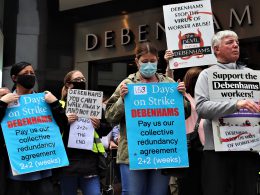In the current economic climate it seems those of us lucky enough to have a low-paid job have forfeited our right to respect and decent treatment. With hundreds of thousands on the live register at the moment, it’s an employers’ market. The employed are feeling the pressure of thousands in the queue behind them, and the pressure of employers trying to cut down on costs.
A supermarket making a huge impact on our recession crazed country is German Discount Supermarket Lidl. However, the company’s customer satisfaction and price cutting drive is having an adverse affect on the welfare of its staff.
As prices come down across the store to entice customers – the staff are expected to make up for the company’s profit loss.
Cashiers are being harried by their supervisors to work faster and managers are harassing their supervisors to do greater workloads in shorter spaces of time. Some staff work up to thirteen hours a day, continuously on their feet, overseeing the running of the entire supermarket from paper work to serving customers, often doing all this without a break to stay on top of their workload.
The company doesn’t allow extra time to accommodate the extra work involved – staff are simply expected to work harder and faster in order to finish on time and maintain productivity levels.
As more and more consumers are drawn to Lidl, this non-union company does not provide more staff to cope with the greater customer numbers. Managers try to maintain Lidl’s productivity levels and 100% friendly commitment. It is harder to keep their staff motivated, they have to juggle the needs of their staff, customers and their own regional managers.
Employees can be scared to stand up for themselves because they are all painfully aware of the hundreds of thousands of unemployed willing to enter into the pressure cooker workplace that is discount supermarket. However, we can’t endure much more in terms of low pay and pressure at work. Young workers will quite simply have to fight for their basic right to a decent, unionised job.










